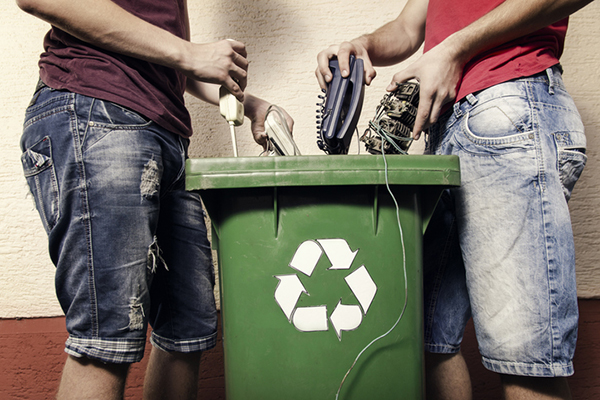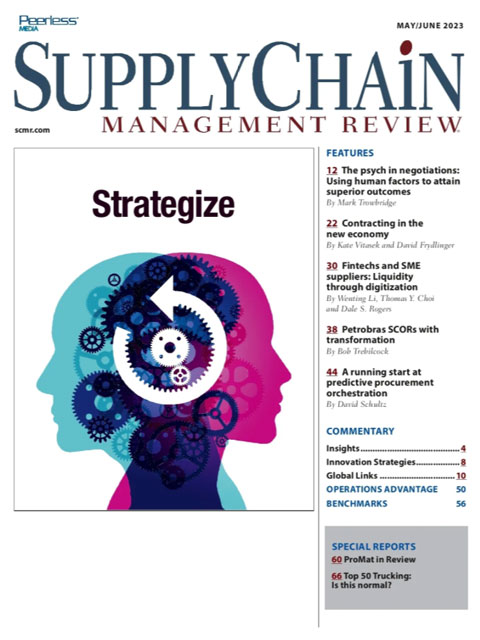Sorry, but your login has failed. Please recheck your login information and resubmit. If your subscription has expired, renew here.
May-June 2023
If you were dropped onto this planet and landed at McCormick Place in the heart of Chicago in the middle of March, you would probably conclude that planet Earth had been overrun by robots. Everywhere you turned on the ProMat conference floor, there was a robot lifting something, putting something away, or carrying something to another location. But, despite a conference hall overrun by technology, the on-the-ground reality is a bit different. Not so long ago, commercial real estate firm Prologis estimated the number of facilities with any type of automation at about 10%. But that is changing—quickly. A recent report from JLL found that one-in-two… Browse this issue archive.Need Help? Contact customer service 847-559-7581 More options
Reduce, reuse, recycle. These 3Rs are commonly known steps toward waste management and environmental sustainability. However, they are not adequate toward countering the increasing amounts of waste generated by complex global supply chains. These 3Rs are predominantly post-mortem efforts that force a great deal of responsibility on the consumers rather than on the producers themselves.
Reverse supply chains ought to be reimagined for sustainability. We propose a design framework that minimizes the new 3Rs—refuse, recall, and returns—which in turn complement the existing reduce, reuse, and recycle initiatives for effective environmental impact.
Is the status quo—maximize reduce, reuse and recycle initiatives—adequate?
Efforts to design sustainable supply chains are receiving traction globally. The status quo focuses on a post-mortem strategy built on the 3Rs—reduce, reuse, recycle.
While these are laudable sustainability efforts, they may not produce the desired results for the environment. A finding by Columbia Climate School indicated that of these 3Rs, most consumers focus on recycling initiatives. Unfortunately, many such recycled items ultimately end up in landfills and choke the environment due to contamination, unfit for further use. A similar study by the United Nations pointed out that recycling is not going to be adequate to contain the accelerating erosion of the environment. This prompts a need to transform the way we manage supply chains.
While forward supply chains are being smartly streamlined and are part of sustainability initiatives, refuse, recall, and returns are complex loops that have a very high environmental impact, but are difficult to address.
A new design approach is required.
Refuse that includes obsoletes, single-use packaging materials, plastic containers, information materials and even QR codes that get printed for tracking contribute to a significant amount of municipal waste. Per an EPA statistic, containers and packaging contribute to an astonishingly higher portion—more than a quarter—of the municipal solid waste.

This complete article is available to subscribers only.
Log in now for full access or start your PLUS+ subscription for instant access.
SC
MR
Sorry, but your login has failed. Please recheck your login information and resubmit. If your subscription has expired, renew here.
May-June 2023
If you were dropped onto this planet and landed at McCormick Place in the heart of Chicago in the middle of March, you would probably conclude that planet Earth had been overrun by robots. Everywhere you turned on the… Browse this issue archive. Access your online digital edition. Download a PDF file of the May-June 2023 issue.Reduce, reuse, recycle. These 3Rs are commonly known steps toward waste management and environmental sustainability. However, they are not adequate toward countering the increasing amounts of waste generated by complex global supply chains. These 3Rs are predominantly post-mortem efforts that force a great deal of responsibility on the consumers rather than on the producers themselves.
Reverse supply chains ought to be reimagined for sustainability. We propose a design framework that minimizes the new 3Rs—refuse, recall, and returns—which in turn complement the existing reduce, reuse, and recycle initiatives for effective environmental impact.
Is the status quo—maximize reduce, reuse and recycle initiatives—adequate?
Efforts to design sustainable supply chains are receiving traction globally. The status quo focuses on a post-mortem strategy built on the 3Rs—reduce, reuse, recycle.
While these are laudable sustainability efforts, they may not produce the desired results for the environment. A finding by Columbia Climate School indicated that of these 3Rs, most consumers focus on recycling initiatives. Unfortunately, many such recycled items ultimately end up in landfills and choke the environment due to contamination, unfit for further use. A similar study by the United Nations pointed out that recycling is not going to be adequate to contain the accelerating erosion of the environment. This prompts a need to transform the way we manage supply chains.
While forward supply chains are being smartly streamlined and are part of sustainability initiatives, refuse, recall, and returns are complex loops that have a very high environmental impact, but are difficult to address.
A new design approach is required.
Refuse that includes obsoletes, single-use packaging materials, plastic containers, information materials and even QR codes that get printed for tracking contribute to a significant amount of municipal waste. Per an EPA statistic, containers and packaging contribute to an astonishingly higher portion—more than a quarter—of the municipal solid waste.
SC
MR


More Sustainability
- How technological innovation is paving the way for a carbon-free future in logistics and supply chains
- Logistics key to supercharging EV battery recycling
- NextGen Supply Chain Conference set for October 21-23
- Why global businesses must consider climate change risks to their supply chains
- Estée Lauder, Schneider Electric and S&S Activewear to receive NextGen End User awards
- 2024 Robotics Application Conference announces session, speaker lineup
- More Sustainability
Latest Podcast

 Explore
Explore
Topics
Procurement & Sourcing News
- Three frameworks for creative problem-solving in supply chain
- Mitigating geopolitical uncertainty: 4 essential tactics for industrial CSCOs
- Supply chain strategy for medical devices: A Q&A with industry expert Sanjay Gupta
- Inventory Management and the Supply Chain: Outlook 2025
- How technological innovation is paving the way for a carbon-free future in logistics and supply chains
- Parcel shipping spend: The untamed holdout in today’s supply chains
- More Procurement & Sourcing
Latest Procurement & Sourcing Resources

Subscribe

Supply Chain Management Review delivers the best industry content.

Editors’ Picks





